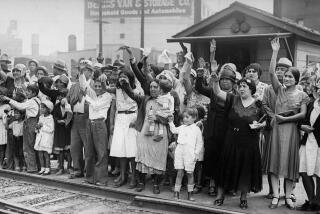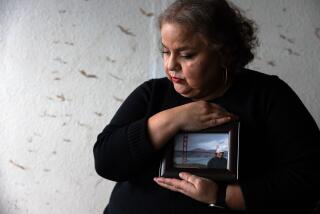Deportation Fear Haunts Former Refugee
MIAMI — Lilliam Portillo came to America in 1985, when she was just 17 and both her Nicaraguan homeland and her future were clouded with gun smoke. The Sandinista government was embroiled in a bloody civil war with the U.S.-backed Contras, and much of Central America was in turmoil.
Along with tens of thousands of her compatriots, Portillo was welcomed as a refugee by the Ronald Reagan administration, and she settled into Miami’s thriving Nicaraguan community.
Now 29, Portillo is married, has three American-born children, is fluent in English and holds a good job with a giant aerospace firm while studying to become a pharmacist.
But under tough new immigration rules now in effect, the future of Portillo and up to 40,000 other Nicaraguans who never became legal residents is again uncertain. They all could be deported.
A host of U.S. Immigration and Naturalization Service reforms has sent panic through dozens of immigrant communities, including those of Haitians and Nicaraguans in Miami and Salvadorans in Los Angeles. For weeks, thousands of anxious immigrants hoping to win residency have been flooding INS offices.
INS officials insist that no mass deportations are planned and that no deportations under the new rules can take place for at least six months. But that has not stopped attorneys for immigrants in Miami from filing several lawsuits that attempt to block deportations. In the latest effort--a class-action suit in which Portillo is one of 40 named plaintiffs--several top immigration lawyers accuse the U.S. government of inducing Nicaraguans and others to file suspension of deportation papers, only to unilaterally declare them ineligible.
The suit, filed in federal district court Friday, contends that the government collected “millions of dollars in application fees to seek suspension of deportation on the promise that their applications would be considered when, in fact, they have now rejected same, without consideration.”
Along with paying a $210 application fee, the immigrants “got records and hired attorneys, with the full expectation that they would have their day in court,” said Mary Kramer, one of the lawyers.
Although immigrants from all over the world are affected by Congress’ attempts to reform both immigration and welfare laws, in Miami those most affected are Nicaraguans. According to attorney Bob Boyer, Nicaraguans entered the United States during the Reagan era through what he called “a wink and a nod policy,” under which INS officials told the refugees: “We’ll let you stay; don’t worry about the paperwork.” Though Portillo and others received deportation orders in the late 1980s, they were told they enjoyed special status as refugees from a leftist regime.
But two years ago, with the war in Nicaragua over, the Clinton administration moved to make the immigration status of almost all refugees standard. (Excepted are Cubans, who continue to enjoy special status as refugees from a Communist government.)
In a recent hearing, an immigration judge terminated Portillo’s suspension of deportation hearing on the grounds that the law precluded granting her help.
“My sister and my mother got residency, and they applied after I did,” she said. “I’m worried. It just seems like there has been no chance for me to explain my case.”
More to Read
Sign up for Essential California
The most important California stories and recommendations in your inbox every morning.
You may occasionally receive promotional content from the Los Angeles Times.










